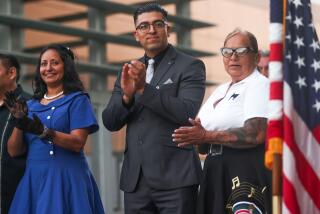Is Boston Mayor Ducking Issues, or Did Challenger Take a Potshot?
BOSTON — This is the story of the mayor, his challenger and a political flap.
Big deal, you say? As if feathers don’t fly in any good electoral fight?
Sure. But this is Boston -- where politics ranks with sports as an official pastime -- and the feathers in this case belong to a beloved family of ducks.
Media consultant Rob Stegman says he meant no disrespect when he created a television commercial for mayoral candidate Maura Hennigan that spoofs Robert McCloskey’s book “Make Way for Ducklings.”
But “Make Way for Menino,” the ad that has been running on local cable stations, has enraged some Bostonians -- notably Nancy Schon, whose bronze sculpture of Mrs. Mallard and her ducklings Lack, Mack, Nack, Pack and Quack resides in a prominent location in the Boston Public Garden.
“These ducks are being politically exploited,” Schon said. “It’s just awful.”
Democratic Mayor Thomas M. Menino is seeking his fourth term. Hennigan, a Democrat who has served on the City Council for 24 years, is his only opponent in the Nov. 8 election. Hennigan says Menino has been avoiding the issues -- namely Boston’s rising homicide rate and increasing property taxes -- while finding time to read to young audiences around the city.
“Make Way for Ducklings,” set in Boston, is often a favorite title when the mayor reads to children, making it an easy target for the Hennigan camp. The TV ad is illustrated in a style reminiscent of the drawings of McCloskey, who died two years ago at 88.
“Make Way for Tom Menino!” the ad’s narrator says. “He’s ducking the issues again!”
Then, just like Mrs. Mallard, the Menino figure rushes down Charles Street, the main thoroughfare on Beacon Hill.
The Mallard family became a fixture on Boston’s cultural landscape as soon as the book was published in 1941. Schon’s sculpture achieved the same status when it was installed in 1987.
Schon said that McCloskey jealously guarded his ducks’ integrity. He refused offers to manufacture “Make Way for Ducklings” products, she said, and agreed to let her make the sculpture only when she promised “never to commercialize or politicize these ducks.”
The duckling sculpture is a frequent meeting spot and is the starting point for a Mother’s Day parade in which children dress up as their favorite duckling.
“These ducks have become an icon in the city of Boston,” she said. “They represent children. They represent families. They represent all the good, old-fashioned values that we all yearn for. I am, in a sense, their guardian, and I know Mr. McCloskey would have been very upset about this. To put them into this political pot, that is just an awful thing.”
Schon said she was a “huge fan” of Menino’s, but added: “I would have been just as angry if Menino’s office had done this.”
Stegman said the ad had generated attention, which was his goal.
“Look at this strategically,” he said. “One of the things we had to do was get Maura’s name more widely known, and that means you had to come up with an unusual approach.”
He called the ad “respectful and light-hearted.”
Political analyst Lou DiNatale of the University of Massachusetts-Boston said Hennigan took a chance by “grabbing an icon and putting it into a political context.” Now, he said, “let’s see how it all plays out.”
More to Read
Get the L.A. Times Politics newsletter
Deeply reported insights into legislation, politics and policy from Sacramento, Washington and beyond. In your inbox three times per week.
You may occasionally receive promotional content from the Los Angeles Times.










